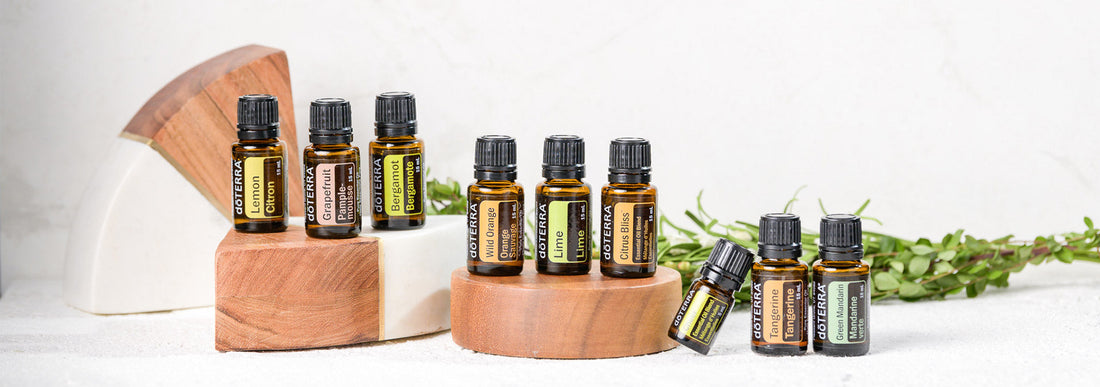
Why Citrus Oils Make You Happy: The Science Behind It
Share
If you look at aromatherapy, citrus oils are the go-to “happy oils.” Their aroma is familiar, uplifting, and unoffensive to most people. Think of peeling an orange, sipping fresh lemonade, or walking past a citrus grove — those scents almost instantly bring a smile.
But it’s not just about pleasant memories. Citrus oils contain botanical compounds that physically and biochemically influence your brain and mood. Let’s explore the science.
The Brain Chemicals of Happiness

Serotonin (5-HT)
- Made in: Mostly the gut (~90%), but in the brain it comes from the raphe nuclei of the brainstem.
- Acts in: Prefrontal cortex (mood, decision-making, impulse control); amygdala (fear/anxiety regulation); hippocampus (memory, resilience); hypothalamus (sleep, appetite, hormone rhythms).
- Effect: Stabilizes mood, promotes contentment, reduces stress reactivity.
Dopamine (DA)
- Made in: Substantia nigra (movement) and ventral tegmental area, VTA (reward/motivation).
- Acts in: Prefrontal cortex (focus, planning, working memory); nucleus accumbens (pleasure, reward, motivation); amygdala (emotion–reward link); hippocampus (motivation–learning link).
- Effect: Motivation, energy, and reinforcement of positive experiences.
Citrus Oils and Limonene
Citrus oils like wild orange, lemon, lime, grapefruit, and bergamot are rich in a compound called limonene.
- When you inhale limonene, it travels directly to the limbic system (amygdala + hippocampus), the emotional center of your brain.
- It interacts with enzymes and receptors that regulate serotonin and dopamine.
- Specifically, limonene helps inhibit MAO enzymes (monoamine oxidase) that normally break down serotonin and dopamine.
- Result: More serotonin and dopamine remain active longer in the synapse (the gap between neurons) — a natural boost in mood, energy, and motivation.

Limonene vs. SSRIs: Why It Matters
This is different from SSRIs (selective serotonin reuptake inhibitors).
- SSRIs block the “reuptake pump” that normally clears serotonin from the synapse, keeping serotonin artificially high. If serotonin builds up too much, it can lead to serotonin syndrome — a dangerous condition (agitation, rapid heart rate, high blood pressure, and in severe cases seizures).
- Limonene works differently: it slows the breakdown of serotonin and dopamine by inhibiting MAO enzymes. This action is gentler and self-limiting — it helps your body use what’s already there more efficiently rather than forcing excessive accumulation. As a result, limonene doesn’t carry the same serotonin-syndrome risk associated with strong pharmaceuticals.
Note: Citrus oils don’t replace medical treatment, but they can be a safe, supportive option for everyday emotional balance.
Limonene vs. MAOIs: Why It Matters
This is different from MAOI medications (monoamine oxidase inhibitors).
- MAOIs block the enzyme system (MAO) that normally breaks down serotonin, dopamine, and norepinephrine. This keeps neurotransmitter levels very high, but it can also cause serious risks: serotonin syndrome when combined with other antidepressants, and even hypertensive crisis if combined with certain foods (like aged cheese, red wine, or fermented products).
- Limonene works differently: it has a much gentler, modulatory effect on MAO activity. Instead of shutting the enzyme system down, it slows it just enough to help serotonin and dopamine stay active longer. This action is lighter, more self-limiting, and doesn’t overwhelm the body’s natural safety checks. As a result, limonene doesn’t carry the same food restrictions or severe side effect risks as pharmaceutical MAOIs.
Note: Citrus oils aren’t medications and don’t replace medical treatment. But they can be a safe, supportive option for promoting mood and emotional balance in everyday life.
Why Synthetic Citrus Isn’t the Same
Even products labeled “citrus” or “lemon” often don’t contain limonene at all.
- True limonene has a light, clean aroma — not overpowering.
- Synthetic fragrances often use artificial aroma chemicals plus fixatives (e.g., phthalates) so the scent lingers and feels stronger.
It’s like comparing fresh-squeezed orange juice to powdered drink mix: one has real beneficial compounds; the other imitates the smell/taste and may include additives you don’t want.
Why Quality Matters
Citrus oils are cold-pressed from the rind. High-quality sourcing and testing help preserve limonene content — the compound tied to mood benefits. That’s why I recommend choosing a trusted brand like doTERRA, where each batch is tested for purity and potency.
Limonene Content at a Glance

Most citrus oils are naturally high in limonene, which explains their similar uplifting effects. One special case is bergamot, which also contains linalyl acetate (the calming ester found in lavender) — giving it a unique synergy (uplifting and calming). I cover bergamot in a separate article.

Citrus oils don’t just smell good — they can shift brain chemistry to help you feel happier, calmer, and more motivated. Through limonene, they allow serotonin and dopamine to remain active longer, offering a natural boost of positivity and energy.
Next time you’re feeling low or sluggish, try diffusing wild orange or lemon oil, or simply inhale from the bottle — you may find yourself smiling before you even realize it.
